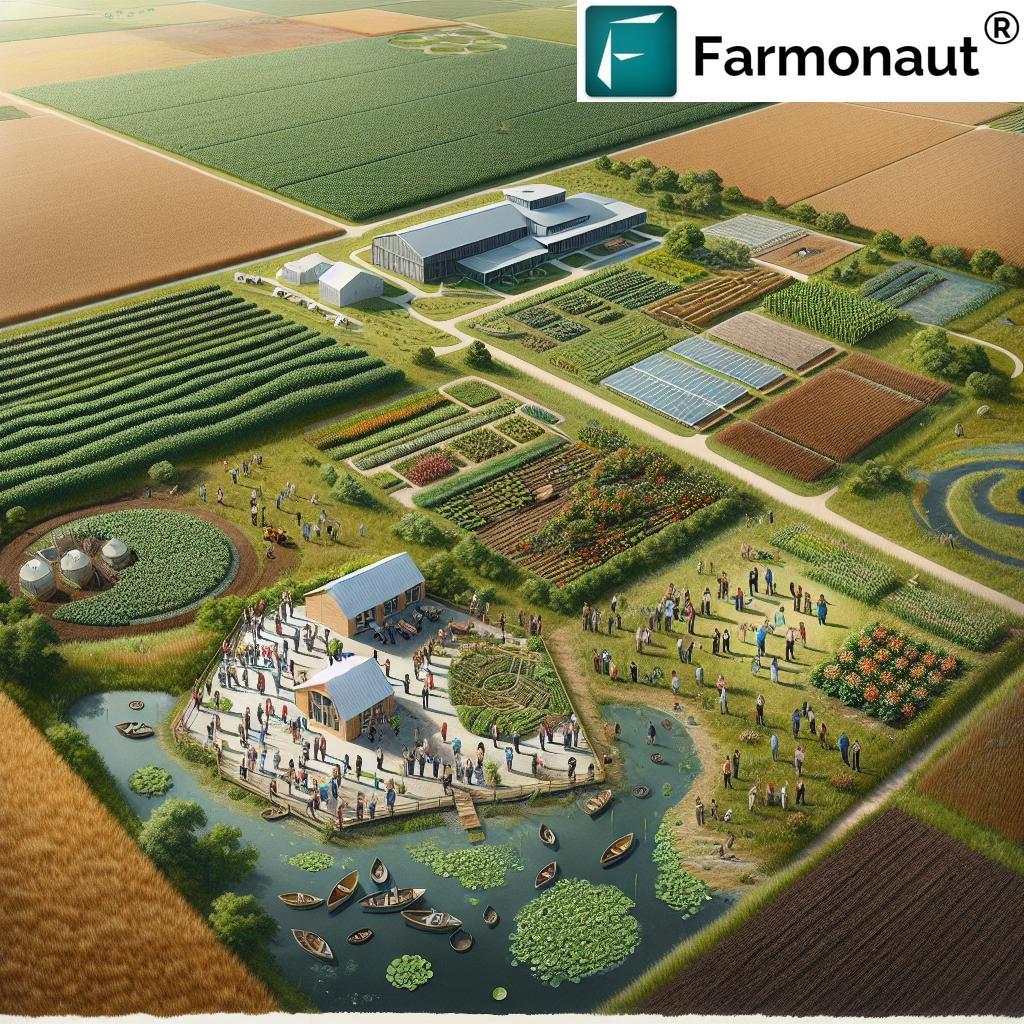Kansas Farm Leaders Honored: Celebrating Excellence in Agricultural Innovation and Sustainability
“Kansas farm leaders’ event recognized individuals with up to 50 years of service in agricultural innovation and sustainability.”

As we gather to celebrate the remarkable achievements of Kansas farm leaders, we are reminded of the vital role agriculture plays in our state’s economy and way of life. The recent 106th annual meeting of the Kansas Farm Bureau (KFB) in Manhattan from December 7-9 was a testament to the dedication, innovation, and resilience of our agricultural community. This event not only recognized outstanding individuals but also highlighted the importance of sustainable farming practices and agricultural leadership development in shaping the future of the Kansas agriculture industry.
In this comprehensive blog post, we’ll delve into the significant contributions of these honored farm leaders, explore the latest trends in agricultural innovation, and discuss the challenges and opportunities facing our industry. From soil health initiatives to farm succession planning, we’ll cover the breadth of topics that are crucial to the continued success of Kansas agriculture.
Honoring Excellence in Kansas Agriculture
The highlight of the KFB annual meeting was undoubtedly the presentation of the Distinguished Service Award. This prestigious recognition was bestowed upon two outstanding individuals who have dedicated their lives to advancing agriculture in Kansas:
- Dan Kerschen of Sedgwick County: With an impressive 50-year tenure in the agricultural sector, Kerschen has not only been a successful farmer but also a committed public servant. His roles in the Kansas House of Representatives and currently as a Kansas Senator have allowed him to advocate for agricultural interests at the highest levels of state government.
- Keith Miller of Barton County: As a 17-year member of the KFB board of directors representing the Seventh District, Miller has been instrumental in addressing crucial issues such as international trade and regional water management. His recent election as chairman of the Kansas Soybean Commission further cements his leadership in the industry.
These leaders exemplify the spirit of innovation and dedication that drives Kansas agriculture forward. Their contributions extend beyond their farms, influencing policy, research, and industry practices that benefit all of us in the agricultural community.
Friends of Agriculture: Recognizing Diverse Contributions
The KFB also presented Friends of Agriculture awards to several individuals who have shown unwavering support for the agricultural sector. These honorees include:
- Donna Bates: A 70-year member and tireless advocate for her county
- Ron and Elaine Dunbar: Long-time supporters of KFB since their marriage
- Jeff Grossenbacher: Served 28 years on KFB’s board
- Doug Harris: Committed to advancing agricultural education
- Kevin Holle: Dedicated participant in Rawlins County Farm Bureau
- Vickie Hoover: Retired after 45 years of service across multiple capacities
- Duane Hund: Contributed significantly through Kansas State University, helping farm families navigate succession and economic challenges
- Carolyn McGinn: Dual role as senator and co-owner of a family grain and agritourism operation
- Galen Niedenthal: 27-year presence on the county board, enhancing agricultural education
- Karl Dawn Stover: Notable educator and FFA advisor, recognized as a Kansas Teacher of the Year semifinalist in 2023
These individuals represent the diverse talents and perspectives that contribute to the strength of our agricultural community. From education to policy-making, their efforts have helped shape a more resilient and innovative industry.
Innovative Approaches to Sustainable Agriculture
One of the most exciting aspects of this year’s meeting was the focus on sustainable farming practices and agritech innovations. We’re seeing a growing emphasis on technologies that can help farmers optimize their operations while conserving natural resources.
For instance, Hayden Guetterman, recipient of the Natural Resources Award, has implemented cutting-edge sustainable farming practices and actively participates in soil health initiatives. His work serves as a model for how we can maintain productive farms while preserving the long-term health of our land.
In the realm of agricultural water management, we’re seeing innovative approaches to conservation and efficiency. Kansas farmers are adopting precision irrigation techniques, drought-resistant crop varieties, and water-saving technologies to address the challenges of water scarcity in our region.
“The Kansas agriculture meeting addressed 7 key areas: leadership, soil health, succession planning, education, trade, conservation, and mental health.”
Supporting the Next Generation of Farmers
The future of Kansas agriculture depends on nurturing young talent and providing them with the tools and knowledge they need to succeed. The KFB meeting emphasized the importance of youth in agriculture and highlighted several initiatives aimed at supporting young farmers and ranchers.
- Agricultural education programs in high schools and colleges are being enhanced to provide students with hands-on experience and exposure to the latest farming technologies.
- Mentorship programs are connecting experienced farmers with newcomers to the industry, facilitating knowledge transfer and support.
- Financial assistance and loan programs specifically designed for young farmers are helping to overcome the significant capital barriers to entering agriculture.
These efforts are crucial for ensuring a smooth transition as older farmers retire and new generations take the helm of Kansas farms.
Addressing Challenges in the Agricultural Sector
While we celebrate our achievements, it’s also important to acknowledge and address the challenges facing our industry. The KFB meeting provided a forum for discussing pressing issues and developing strategies to overcome them:
- International trade: With global markets becoming increasingly interconnected, Kansas farmers are navigating complex trade relationships and regulations. The meeting addressed ways to expand market access and protect the interests of local producers in international trade agreements.
- Climate change adaptation: Changing weather patterns and increased frequency of extreme events are posing new challenges for farmers. Discussions centered on adaptive strategies and resilience-building measures to ensure the long-term viability of Kansas agriculture.
- Rural mental health: The unique stressors faced by farming communities were brought to the forefront, with Will Stutterheim receiving the Rural Minds Matter Advocate of the Year award for his efforts in addressing mental health issues in farming communities.

The Role of Technology in Modern Farming
As we look to the future of Kansas agriculture, technology plays an increasingly crucial role. Innovative solutions are helping farmers make more informed decisions, optimize resource use, and increase productivity. While not directly affiliated with the KFB event, it’s worth noting that companies like Farmonaut are at the forefront of this technological revolution in agriculture.
Farmonaut offers advanced, satellite-based farm management solutions that can benefit Kansas farmers in several ways:
- Real-time crop health monitoring using satellite imagery
- AI-driven advisory systems for personalized farm management
- Blockchain-based traceability for enhancing supply chain transparency
- Tools for efficient resource and fleet management
These technologies align with the goals of sustainable agriculture and efficient resource management that were emphasized at the KFB meeting. For Kansas farmers interested in exploring these solutions, Farmonaut offers various access points:



For those interested in integrating these technologies into existing systems, Farmonaut also offers an API with comprehensive developer documentation.
The Importance of Farm Succession Planning
One of the critical issues addressed at the KFB meeting was farm succession planning. As the average age of Kansas farmers continues to rise, ensuring smooth transitions between generations becomes increasingly important. Duane Hund’s contributions in this area, helping farm families navigate the complexities of succession, highlight the significance of this issue.
Effective succession planning involves several key components:
- Legal and financial planning to address tax implications and asset transfer
- Communication strategies to ensure all family members are aligned on the succession plan
- Training and mentorship to prepare the next generation for farm management
- Consideration of innovative business structures that can accommodate multiple family members or non-family partners
By prioritizing succession planning, we can help ensure the continuity of family farms and the preservation of agricultural knowledge and traditions.
Advancing Agricultural Research and Extension
The KFB meeting also highlighted the critical role of research and extension programs in driving innovation and supporting farmers. Kansas State University, in particular, was recognized for its contributions to agricultural advancement in the state.
Current areas of focus in agricultural research include:
- Development of drought-resistant crop varieties
- Precision agriculture technologies for optimizing inputs and yields
- Sustainable livestock management practices
- Soil health and conservation techniques
- Climate-smart agriculture strategies
These research initiatives, coupled with robust extension programs, ensure that the latest scientific findings and best practices reach farmers across the state, helping to improve productivity and sustainability.
The Role of Agricultural Committees and Commissions
Agricultural committees and commissions play a vital role in shaping policy and addressing industry-wide challenges. The KFB meeting recognized the importance of these organizations in advocating for farmers’ interests and driving positive change in the sector.
Key functions of these bodies include:
- Representing farmers’ interests in policy discussions at state and national levels
- Coordinating research efforts and funding allocation
- Developing marketing and promotion strategies for Kansas agricultural products
- Addressing emerging issues such as biosecurity and food safety
The election of Keith Miller as chairman of the Kansas Soybean Commission underscores the importance of farmer representation in these influential positions.
Celebrating Family Farms and Rural Communities
At the heart of Kansas agriculture are the family farms and rural communities that have long been the backbone of our state’s economy and culture. The KFB meeting emphasized the importance of supporting these foundational elements of our agricultural landscape.
Initiatives highlighted at the meeting included:
- Programs to support rural economic development and diversification
- Efforts to improve rural infrastructure, including broadband internet access
- Strategies for enhancing quality of life in rural areas to attract and retain residents
- Recognition of multi-generational family farms and their contributions to local communities
By supporting family farms and rural communities, we ensure the long-term viability and vitality of Kansas agriculture.
Kansas Agricultural Leaders Recognition Table
| Name | Area of Expertise | Years of Service | Key Achievements |
|---|---|---|---|
| Dan Kerschen | Agricultural Policy | 50+ years | Served in Kansas House of Representatives and Senate; Active in National Cattlemen’s Beef Association |
| Keith Miller | International Trade & Water Management | 30+ years | 17 years on KFB board; Elected chairman of Kansas Soybean Commission |
| Hayden Guetterman | Soil Health & Sustainable Farming | 20-30 years | Implemented innovative sustainable farming practices; Active in soil health initiatives |
| Duane Hund | Farm Succession Planning | 30+ years | Helped farm families navigate succession and economic challenges through Kansas State University |
| Karl Dawn Stover | Agricultural Education | 20-30 years | FFA advisor; Kansas Teacher of the Year semifinalist in 2023 |
Looking to the Future of Kansas Agriculture
As we reflect on the achievements celebrated at the KFB annual meeting, we’re filled with optimism for the future of Kansas agriculture. The dedication, innovation, and resilience demonstrated by our farm leaders provide a strong foundation for addressing the challenges and opportunities that lie ahead.
Key areas of focus for the future include:
- Continued investment in agricultural technology and precision farming techniques
- Expansion of sustainable farming practices to preserve our natural resources
- Enhanced support for young farmers and agricultural education programs
- Strengthening of rural communities and family farms
- Ongoing advocacy for favorable agricultural policies at state and national levels
By working together and building on the legacy of excellence recognized at this year’s KFB meeting, we can ensure a bright and prosperous future for Kansas agriculture.
Frequently Asked Questions
- What is the Kansas Farm Bureau (KFB)?
The Kansas Farm Bureau is a non-profit advocacy organization representing the interests of farmers and ranchers in Kansas. It provides support, resources, and a unified voice for the agricultural community. - How often is the KFB annual meeting held?
The KFB annual meeting is held once a year, typically in December. The 2023 meeting was the 106th annual gathering. - What is the Distinguished Service Award?
The Distinguished Service Award is the highest honor presented by the Kansas Farm Bureau, recognizing individuals who have made exceptional contributions to agriculture in the state over an extended period. - How can young farmers get involved with KFB?
Young farmers can join their local county Farm Bureau, participate in Young Farmers & Ranchers programs, attend educational events, and apply for leadership development opportunities offered by KFB. - What are some key challenges facing Kansas agriculture today?
Key challenges include water scarcity, climate change adaptation, international trade uncertainties, farm succession planning, and maintaining the economic viability of rural communities.
In conclusion, the 106th annual meeting of the Kansas Farm Bureau was a powerful reminder of the strength, innovation, and dedication that characterize our agricultural community. By honoring our leaders, embracing sustainable practices, and fostering the next generation of farmers, we’re laying the groundwork for a resilient and prosperous future in Kansas agriculture. As we move forward, let’s continue to support one another, advocate for our industry, and embrace the innovations that will help us meet the challenges of tomorrow.



